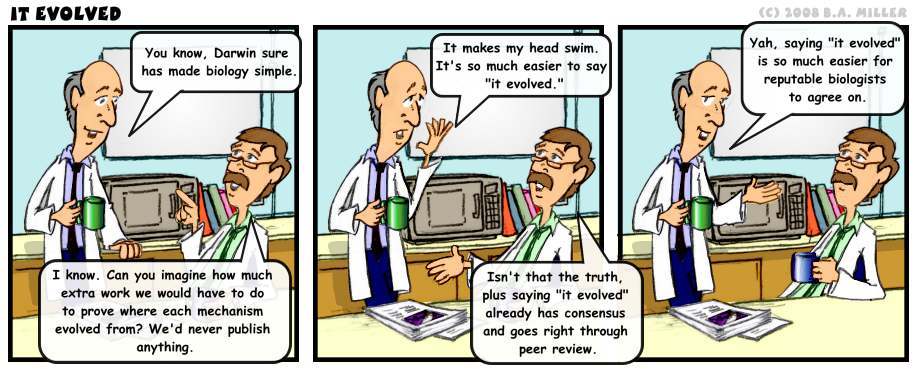When you’re the only team allowed on the field, you can move the goalposts at will.
Evolutionary biologists are continually surprised by a world that doesn’t fit their expectations. They have no fear of falsification, though, because all other explanations beside Darwin’s have been ruled out. They just move the goalposts and carry on.
Lichens “Way Younger than Thought”
In the old evolutionary saga, lichens were among the first plants to colonize the land. That was because these symbiotic communities of primitive algae and fungi were needed to break down the rocks so that “real” plants could take root. Now, they’re saying lichens are among the youngest plants. Surprised scientists at the Field Museum in Chicago report, “Lichens are way younger than scientists thought.” But no matter how wrong the evolutionists were, they are sure that lichens evolved.
“The question of when lichens evolved and how many times fungi evolved the ability to form symbiotic relationships with algae has been a bit contentious in the past,” says Nelsen.
But to accurately determine when lichens evolved, scientists needed to examine the evolutionary history of both the fungi and algae that make them up. The early lichen fossil record isn’t very clear; it can be hard to tell lichen fossils apart from other fossils, and all the fossils that scientists know for sure are lichens are younger than the oldest complex plant fossils. So, the researchers used the fossils that were available to extrapolate the ages of family trees of lichen-forming fungi and algae. They compared these family trees with ages of fossil plants. The verdict: lichens probably evolved long after complex plants.
“Lichens aren’t as old as we thought they were. They’re a younger, newer sort of symbiosis and haven’t been around forever, covering the earth long before there were plants and animals running around,” says Nelsen.
Fish Brains
Land animals are supposed to be the superior animals at judging distances. Now, however, New Scientist is reporting that “Fish can judge distances accurately just like land animals can.” Ruby Prosser Scully is sure that this surprising ability evolved. It just means that this complex ability, requiring specialized “grid cells” in the brain that work like the human hippocampus, evolved earlier than thought—400 million years ago. Her Darwinian experts at Macquarie University are ready with a Poof Spoof story:
Triggerfish have an impressive ability to estimate how far they have swum, and scientists think that understanding this may shed light on the how all animals with a backbone evolved the ability to navigate spaces.
This part of the brain is critical to the way we navigate, and – if analogous in fish – could mean that spatial memory first evolved 400 million years ago when these fish, mammals and birds shared a common ancestor.
“Grid cells may well be a universal vertebrate tool which may have its evolutionary roots in fishes,” says Brown. “However, a lot more work needs to be done in this area to pinpoint the exact mechanism.”
For these tricks of the Darwin trade, see Darwin Flubber, Poof Spoof and Futureware in the Darwin Dictionary.
Animal Sexuality
Many animals exhibit same-sex behavior (SSB) and different sex behavior (DSB). Some have tried to justify human homosexuality on that basis, but evolutionary biologists at Yale University avoid that terminology:
For the paper, the researchers explained that they use the terms “same-sex behaviors” and “different-sex behaviors” rather than terms such as homosexuality or heterosexuality to avoid conflation with terms for human sexual identities.
The problem for Darwinism, though, is that SSB doesn’t make make any evolutionary sense. The press release explains why:
Over the years, scientists have recorded same-sex sexual behavior in more than 1,500 animal species, from snow geese to common toads. And for just as long evolutionary biologists studying these behaviors have grappled with what has come to be known as a “Darwinian paradox”: How can these behaviors be so persistent when they offer no opportunity to produce offspring?
For a long time, evolutionists have scratched their heads at behaviors that seem costly with no benefit, and therefore should not have been naturally selected. What to do? Just move the goal posts by 90 degrees, and ask different questions. First, the Yale evolutionists deny that the behavior is costly. Then, they say it is not aberrant but normal, and has no effect on natural selection (i.e., it is a “neutral” behavior). From there, they invent a story that animals are bisexual and promiscuous. If animals mate more often, they will reproduce at least part of the time.
Moreover, the authors suggest that not only are same-sex behaviors often “not costly,” but can be advantageous from a natural selection perspective because individuals are more likely to mate with more partners. Many species aren’t inherently monogamous but instead try to mate with more than one individual. In many species it can be difficult for individuals to even discern between different sexes.
Whatever happened, it evolved. Once again, Darwinism is rescued from falsification!
